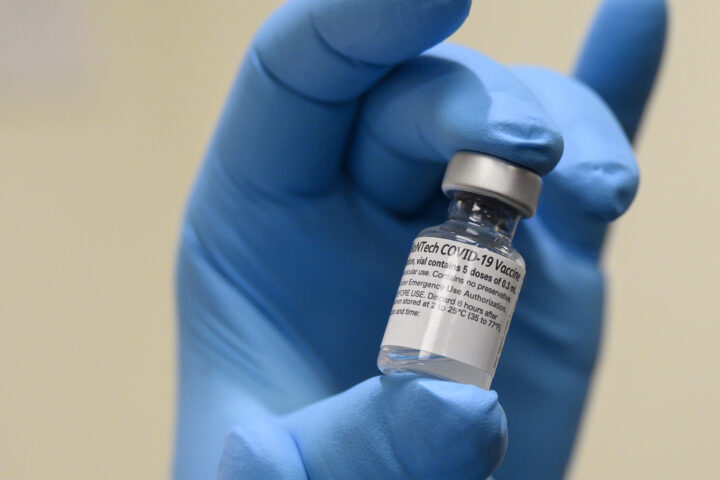- Have any questions? Contact us!
- info@dr-rath-foundation.org

47 Percent Of New Drugs In The United States Come With Price Tag Of $150,000 Or More
June 22, 2022
China Bank Protest Stopped By Health App Codes Turning Red, Depositors Say
June 30, 2022New Analysis Shows Pfizer & Moderna COVID-19 Vaccines More Likely To Cause Serious Adverse Events Than Prevent Hospitalization

Army Spc. Angel Laureano holds a vial of the COVID-19 vaccine, Walter Reed National Military Medical Center, Bethesda, Md., Dec. 14, 2020. (DoD photo by Lisa Ferdinando)
A new analysis by British Medical Journal senior editor Peter Doshi and colleagues shows that the Pfizer and Moderna mRNA COVID-19 vaccines are statistically more likely to cause serious adverse events than they are to prevent hospitalization. Published in preprint form the paper examines serious adverse events reported in the vaccines’ placebo-controlled, phase III randomized clinical trials. The analysis found that while the Pfizer vaccine reduced the risk of hospitalization from COVID-19 by 2.3 per 10,000 participants relative to the placebo group, and the Moderna vaccine by 6.4 per 10,000 participants, together the injections were associated with an increase in serious adverse events of 12.5 per 10,000 participants.
The paper describes how in 2020, prior to the COVID-19 vaccine rollout, the Coalition for Epidemic Preparedness Innovations and the Brighton Collaboration created a priority list, endorsed by the World Health Organization (WHO), of potential adverse events relevant to COVID-19 vaccines. Doshi and his colleagues leveraged this list to evaluate ‘serious adverse events of special interest’ observed in phase III randomized trials of the Pfizer and Moderna vaccines.
A ’serious adverse event’ is defined in the paper as an event that resulted in any of the following:
- Death.
- An event that was life-threatening at the time it occurred.
- Inpatient hospitalization or prolongation of an existing hospitalization.
- Persistent or significant disability/incapacity.
- A congenital anomaly/birth defect.
- A medically important event, based on medical judgment.
The analysis found that the Pfizer mRNA COVID-19 vaccine was associated with an increased risk of serious adverse events of special interest, with an absolute risk increase of 10.1 events per 10,000 people vaccinated. For the Moderna vaccine the increase was 15.1 per 10,000 people vaccinated. Together the injections were associated with an increase of 12.5 events per 10,000 vaccinated participants. Doshi and his colleagues note that in both trials the risk of serious adverse events of special interest occurring surpasses the reduction in the risk of COVID-19 hospitalization relative to the placebo groups.
The possibility of criminal investigations
The new analysis comes at a time when there is growing concern over the health risks of COVID-19 vaccines. Recent research has now confirmed that the mRNA forms of the injections can cause severe liver damage, for example. Other known side effects include very low platelet counts (thrombocytopenia); high rates of severe, potentially life-threatening allergic reactions (anaphylaxis); inflammation of the heart muscle (myocarditis); blood clots (thrombosis); and even death.
Based on the increasing mountain of scientific evidence attesting to these dangers, in November 2021 Dr. Matthias Rath issued an emergency call for the immediate suspension of RNA- and DNA-based COVID-19 vaccines. Demanding that an international investigation be launched into their side effects, he stressed the importance of this being carried out independently of the vaccine manufacturers. With some of the data used in the Pfizer trials now publicly alleged to have been falsified, not only has the need for such an investigation become a matter of urgency, the possibility of it ultimately leading to criminal investigations cannot be ruled out.




